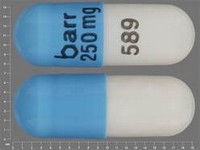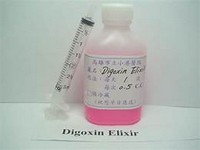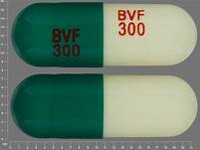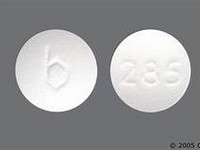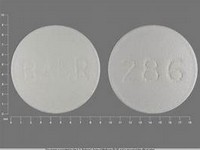Topiramate

CLINICAL USE
Anti-epileptic agent Prophylactic treatment of migraine
DOSE IN NORMAL RENAL FUNCTION
Epilepsy: 50–400 mg twice daily Migraine: Initially, 25 mg at night. Maintenance, 25–50 mg twice daily
PHARMACOKINETICS
Molecular weight : 339.4 %Protein binding : 9–17 %Excreted unchanged in urine : 70 Volume of distribution (L/kg) : 0.55–0.8 half-life – normal/ESRD (hrs) : 20–30/48–60 (12–15 hours if used with another enzyme-inducing anti-epileptic drug) DOSE IN RENAL IMPAIRMENT
GFR (mL/MIN)
20 to 50 : Migraine/epilepsy: Dose as in normal renal function 10 to 20 : Migraine: Dose as in normal renal function Epilepsy: 50% of normal dose and increase according to response <10 : Migraine: Dose as in normal renal function Epilepsy: 25–50% of normal dose and increase according to response DOSE IN PATIENTS UNDERGOING RENAL REPLACEMENT THERAPIES
CAPD : Unknown dialysability. Dose as for GFR <10 mL/min HD : Dialysed. Dose as for GFR <10 mL/min HDF/high flux : Dialysed. Dose as for GFR <10 mL/min CAV/VVHD : Unknown dialysability. Dose as for GFR 10 to 20 mL/min IMPORTANT DRUG INTERACTIONS
Potentially hazardous interactions with other drugs Antidepressants: antagonism of anticonvulsant effect Anti-epileptics: concentration reduced by phenytoin and carbamazepine; increases phenytoin concentration Antimalarials: mefloquine antagonises anticonvulsant effect; chloroquine and hydroxychloroquine occasionally reduces convulsive threshold Oestrogens and progestogens: reduced contraceptive effect ADMINISTRATION
Reconstition
– Route
Oral Rate of Administration
– Comments
– OTHER INFORMATION
Patients with moderate to severe renal impairment may take 10–15 days to reach steady state, compared to 4–8 days in patients with normal renal function A higher frequency of renal stones has been noted in topiramate treated patients, although the risk is not related to dose or duration of therapy. Adequate hydration is recommended to reduce this risk .
See how to identify renal failure stages according to GFR calculation
See how to diagnose irreversible renal disease
Home




